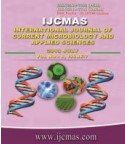


 National Academy of Agricultural Sciences (NAAS)
National Academy of Agricultural Sciences (NAAS)

|
PRINT ISSN : 2319-7692
Online ISSN : 2319-7706 Issues : 12 per year Publisher : Excellent Publishers Email : editorijcmas@gmail.com / submit@ijcmas.com Editor-in-chief: Dr.M.Prakash Index Copernicus ICV 2018: 95.39 NAAS RATING 2020: 5.38 |
Food grain in India continue to be main pillar of food security and out of various crops grown, rice, wheat and pulses are still part of the staple diet of most of the rural population. Out of the various crops grown, rice, wheat and sugarcane are prone to crop residue burning. These crops are preferred by farmers since they provide higher economic return, as compared to other crops. Under the situation, appropriate package of technical intervention for crop residues management through information education communication and imparting knowledge to the end user i.e. farmers remained demand of the current era and futuristic approach. Since the crop residue management is long term process, accordingly the usage of information education communication was made and observed it impact along with the challenges faced. Through the usage of information education communication and imparting knowledge to the targeted farmers, the area of burning in the periphery of Panipat district was minimum among different districts of the Haryana state, however still the various challenges are to be managed in integrated manner in the future also. Nexus thinking will promote higher level of integration and higher level of stakeholder involvement to provide the supporting platform for solving the issue of crop residue management.
 |
 |
 |
 |
 |